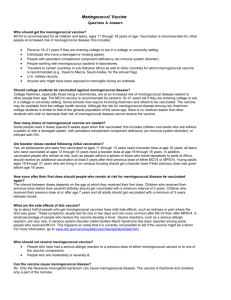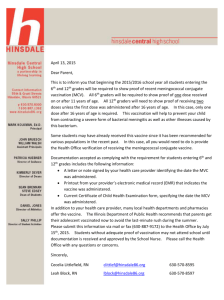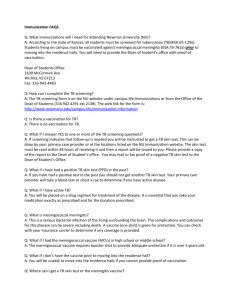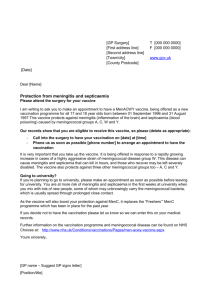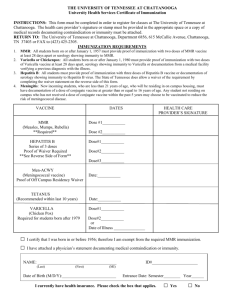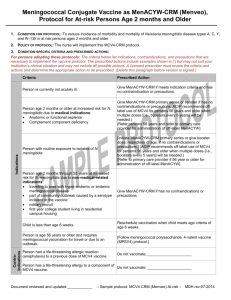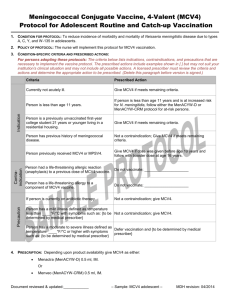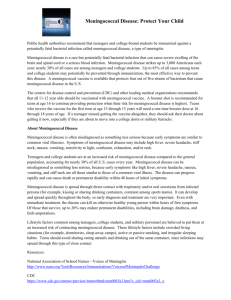Meningococcal Vaccination
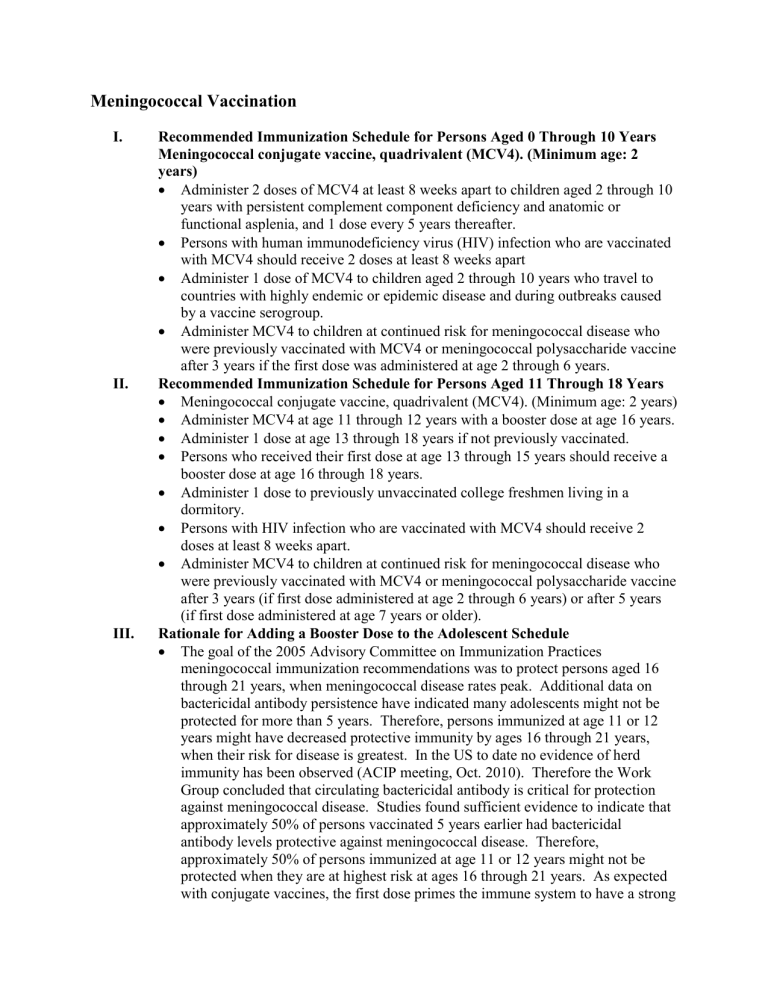
Meningococcal Vaccination
I.
Recommended Immunization Schedule for Persons Aged 0 Through 10 Years
Meningococcal conjugate vaccine, quadrivalent (MCV4). (Minimum age: 2 years)
Administer 2 doses of MCV4 at least 8 weeks apart to children aged 2 through 10 years with persistent complement component deficiency and anatomic or functional asplenia, and 1 dose every 5 years thereafter.
Persons with human immunodeficiency virus (HIV) infection who are vaccinated with MCV4 should receive 2 doses at least 8 weeks apart
Administer 1 dose of MCV4 to children aged 2 through 10 years who travel to countries with highly endemic or epidemic disease and during outbreaks caused by a vaccine serogroup.
Administer MCV4 to children at continued risk for meningococcal disease who were previously vaccinated with MCV4 or meningococcal polysaccharide vaccine after 3 years if the first dose was administered at age 2 through 6 years.
II.
Recommended Immunization Schedule for Persons Aged 11 Through 18 Years
Meningococcal conjugate vaccine, quadrivalent (MCV4). (Minimum age: 2 years)
Administer MCV4 at age 11 through 12 years with a booster dose at age 16 years.
Administer 1 dose at age 13 through 18 years if not previously vaccinated.
Persons who received their first dose at age 13 through 15 years should receive a booster dose at age 16 through 18 years.
Administer 1 dose to previously unvaccinated college freshmen living in a dormitory.
Persons with HIV infection who are vaccinated with MCV4 should receive 2 doses at least 8 weeks apart.
Administer MCV4 to children at continued risk for meningococcal disease who were previously vaccinated with MCV4 or meningococcal polysaccharide vaccine after 3 years (if first dose administered at age 2 through 6 years) or after 5 years
(if first dose administered at age 7 years or older).
III.
Rationale for Adding a Booster Dose to the Adolescent Schedule
The goal of the 2005 Advisory Committee on Immunization Practices meningococcal immunization recommendations was to protect persons aged 16 through 21 years, when meningococcal disease rates peak. Additional data on bactericidal antibody persistence have indicated many adolescents might not be protected for more than 5 years. Therefore, persons immunized at age 11 or 12 years might have decreased protective immunity by ages 16 through 21 years, when their risk for disease is greatest. In the US to date no evidence of herd immunity has been observed (ACIP meeting, Oct. 2010). Therefore the Work
Group concluded that circulating bactericidal antibody is critical for protection against meningococcal disease. Studies found sufficient evidence to indicate that approximately 50% of persons vaccinated 5 years earlier had bactericidal antibody levels protective against meningococcal disease. Therefore, approximately 50% of persons immunized at age 11 or 12 years might not be protected when they are at highest risk at ages 16 through 21 years. As expected with conjugate vaccines, the first dose primes the immune system to have a strong
response to the booster dose. Local and systemic reactions to the booster were comparable to those in persons receiving a first dose. The duration of protective antibody after the booster dose is not known but is expected to last through age 21 years for booster doses administered at ages 16 through 18 years.
IV.
Rationale for a 2-Dose Primary Series for Persons with a Reduced Response to a
Single Dose.
Evidence supporting the need for a 2-dose primary meningococcal vaccine series for the small number of persons at increased risk for meningococcal disease was reviewed by the Work Group. Data indicated that serum bactericidal activity
(SBA) could be increased with 2 doses, 2 months apart. For persons who are asplenic or have HIV infection, a 2-dose primary series improves the initial immune response to vaccination. A 2-dose primary series in patients with persistent complement component deficiency will help achieve the high levels of
SBA activity needed to confer protection in the absence of effective opsonization.
The complement pathway is important to preventing meningococcal disease, and
Neisseria meningitidis is the primary bacterial pathogen affecting persons with late complement component (LCCD) or properidin deficiency. Although persons with LCCD are able to mount an overall antibody response equal to complementsufficient persons after vaccination with meningococcal polysaccharide vaccine, antibody titers wane more rapidly. Asplenic persons are at increased risk for invasive infection caused by many encapsulated bacteria, including N. meningitides. Moreover, the mortality rate is approximately 40%-70% among those persons when they do become infected with N. meningitidis. The safety and immunogenicity of a 2-dose primary series has not been studied in older children and adults.
V.
Recommendation for Persons Aged 2 through 54 Years with Reduced Immune
Response.
Routine vaccination of healthy persons who are not at increased risk for exposure to N. meningitidis is not recommended after age 21 years. Persons with persistent complement component deficiencies (e.g., C5-C9, properidin, factor H or factor
D) or asplenia should receive a 2-dose primary series administered 2 months apart and then receive a booster dose every 5 years. Adolescents aged 11 through 18 years with HIV infection should be routinely vaccinated with a 2-dose primary series administered 2 months apart. All other persons at increased risk for meningococcal disease (e.g., macrobiologists or travelers to an epidemic or highly endemic country) should receive a single dose.
VI.
At What Age Should Children Receive Vaccination?
All 11-12 year olds should be vaccinated with meningococcal conjugate vaccine
(MCV4). A booster dose should be given at age 16 years. For adolescents who receive the first dose at age 13 through 15 years, a one-time booster dose should be administered preferably at age 16 through 18 years. Healthy adolescents who receive their first dose of MCV4 at or after age 16 do not need a booster dose.
Adolescents who need a booster dose can get it any time between age 16 and 18 years, preferably at 16. The meningococcal vaccine is also recommended for certain high risk children from ages 2 through 10.
VII.
Adults Who Should Receive the Vaccine:
College freshmen living in a dormitory
Military recruits
Persons with a damaged or missing spleen
Persons with complement deficiency
Microbiologists exposed to N. meningitidis
Persons residing in or traveling to countries where disease is common.
Resources:
“Updated Recommendations for Use of Meningococcal Vaccines – Advisory Committee on Immunization Practices”, Centers for Disease Control and Prevention, Morbidity and
Mortality Weekly, January 28, 2011; 60(03); 72-76.
Centers for Disease Control and Prevention, Vaccines and Immunizations,
“Meningococcal: Who Needs to be Vaccinated”.
Moye, Edgerton and Flake, “What are the indications for meningococcal vaccination?”;
Journal of Family Practice, May, 2007.
Centers for Disease Control and Prevention, “The Recommended Immunization
Schedules for Persons Aged 0 through 18 Years”, Advisory Committee on Immunization
Practices, Department of Health and Human Services.
